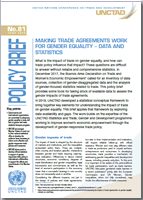
What is the impact of trade on gender equality, and how can trade policy influence that impact? These questions are difficult to answer without reliable and comprehensive statistics. In December 2017, the Buenos Aires Declaration on Trade and Women's Economic Empowerment1 called for an inventory of data sources, collection of gender-disaggregated data and the analysis of gender-focused statistics related to trade.
This policy brief provides some tools for taking stock of available data to assess the gender impacts of trade agreements. In 2018, UNCTAD developed a statistical conceptual framework to bring together key elements for understanding the impact of trade on gender equality.
This brief applies that framework by exploring data availability and gaps. The work builds on the expertise of the UNCTAD Statistics and Trade, Gender and Development programme working to improve women's economic empowerment through the development of gender-responsive trade policy.
Key points:
-
Governments and international organizations are committed to advancing gender equality in trade, but lack of gender and trade statistics hampers progress.
-
UNCTAD encourages Member States to reach out to their national statistical office to develop the evidence base necessary to inform more effective and gender-responsive trade policies and measures.
-
UNCTAD drives work to develop official statistics in support of genderresponsive trade policy in international collaboration to support the efforts and commitments of its Member States.





